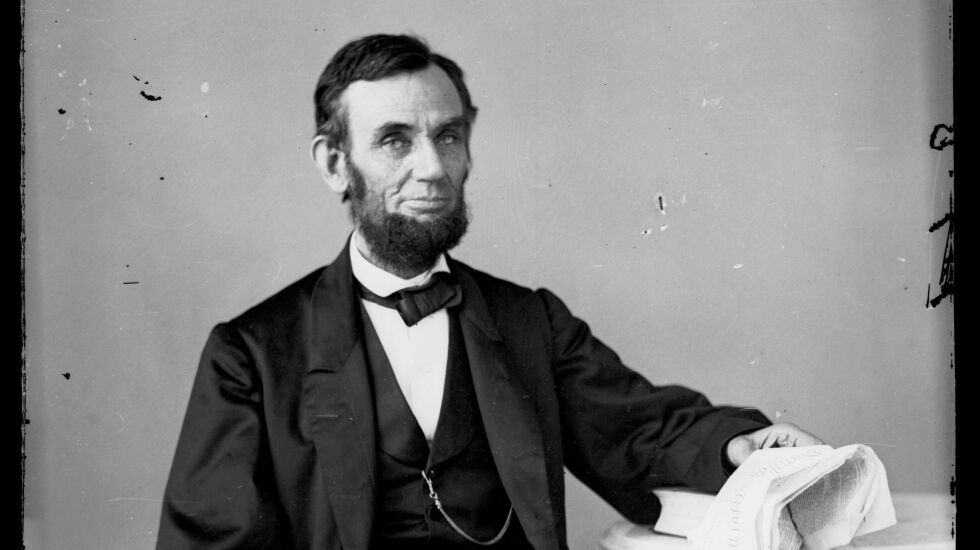
As a student of politics, I was honored to receive an advance copy of Jon Meacham’s, And There Was Light: Abraham Lincoln and the American Struggle.
Meacham is a Pulitzer Prize-winning biographer, whose broad commitment to civic education is reflected in efforts including speechwriting for President Joe Biden and his eulogy of President George H.W. Bush. When he writes about someone as complex as Lincoln, during a time more divisive than today, there are important lessons to learn.
A first lesson: Incremental progress is important for solving difficult policy problems. The book traces such progress, from the abolition of slavery in Washington, D.C. in 1862, to the Emancipation Proclamation freeing slaves in states that had seceded in 1863, to the 13th Amendment abolishing slavery in 1865.
Today, this approach can be used to strengthen gun laws. Both liberal Highland Park Mayor Nancy Rotering and conservative U.S. Rep. Adam Kinzinger, R-Ill., agree that Congress raising the minimum age for purchase of assault weapons to 21, with narrow exceptions, is a possible step focused on individuals with the greatest propensity to engage in mass shootings.
Next: While federalism plays an important role in our democracy, issues involving bodily autonomy, including slavery and abortion, may dictate uniform solutions. Practically, it is unlikely that a state-by-state approach to abortion law can, or should, persist over time. Opinion polling and developments in states with divided government suggest that a federal abortion ban after the critical 20-week ultrasound (with exceptions in cases of rape, incest or when the life of the mother is at risk) may be the key to resolving this divisive issue, even though the margin of passage may be as slim as the 13th Amendment.
Third, Lincoln shows that people battling depression can lead fulfilling lives with love from others. This weakness may even become their strength — a source of Lincoln’s legendary empathy. His close network of friends, including business partner Joshua Speed, helped Lincoln emerge from a suicidal depression in 1841 following the temporary breaking of his engagement to his future wife Mary. Embracing personal agency’s purposeful action, suggested by his comment to Speed that his greatest regret was that “he had done nothing to make any human being remember that he had lived; and to connect his name with the events transpiring in his day and generation,” helped Lincoln emerge from depression throughout his life.
Fourth, the bond between Lincoln and abolitionist Frederick Douglass demonstrates the necessity of leaning into relationships that test our convictions. They clashed over the pace of emancipation, Lincoln’s initial support for sending freed slaves to Africa or the Caribbean, and equal pay and treatment for African American soldiers. At Douglass’ last White House visit, where he was initially barred from entering, Lincoln greeted Douglass warmly, stating, “I am glad to see you. I saw you in the crowd to-day, listening to my [second] inaugural address…Douglass; there is no man in the country whose opinion I value more than yours. I want to know what you think of it.” The White House Historical Association observed, “[t]his meeting, where a formerly enslaved man was greeted by the American president as a “man among men,” resonated with Douglass for the rest of his life.”
Finally, Lincoln’s religious convictions ensured that his actions as a leader were consistent with serving a cause greater than himself. As Meacham movingly describes, “To Lincoln, God whispered His will through conscience, calling humankind to live in accord with the laws of love.” Lincoln said that he could not remember a time when he did not feel that slavery was wrong and believed in the principle of the Declaration of Independence that “all men are created equal.” Through challenges involved with putting these core principles into action in the fight against slavery, it was Lincoln’s constant fidelity that ensured his eventual success. When selecting our political leaders, we should look for individuals that seek to embrace the transcendental principles of truth, goodness and beauty, whether through religious or ethical training, as we have seen recently the damaging results when leaders do not have a strong moral compass to guide their actions.
The last chapter describes the contents of Lincoln’s wallet after his assassination, including a clipping from the Liverpool Daily Post: “Absolute truth, stern resolution, clear insight, solemn faithfulness, courage that cannot be daunted, hopefulness that cannot be dashed — these are qualities that go a long way to make up a hero. And it would not be easy to dispute Mr. Lincoln’s claim to all these.” Hopefully our country will again be blessed with a new generation of political servant leaders who recommit themselves to these timeless principles.
Andrew Eastmond is a member of the American Enterprise Institute Leadership Network and a trustee in the Village of Riverwoods. He is on Twitter at @eastmond_andrew.
The views and opinions expressed by contributors are their own and do not necessarily reflect those of the Chicago Sun-Times or any of its affiliates.
The Sun-Times welcomes letters to the editor and op-eds. See our guidelines.







